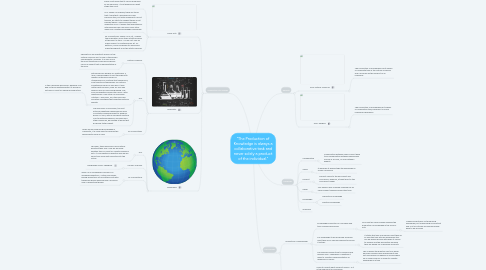
1. Connections to Classes
1.1. Visual Arts
1.1.1. In the arts, production of knowledge is very specific. One must be careful not to confuse producing a painting as production of knowledge. However this essay must argue that it can be produced by an individual - it just depends on what stage they're at.
1.1.2. RLS: When I'm drawing, there are times that I think that I developed my own personal style, but after speaking to my art teacher, he starts to suggest things or art periods where I subconsciously drew inspiration from. It shows that everything is interlinked and we can never really stray away from creating knowledge individually.
1.1.3. PK Connections: When I'm in Art, I always take inspiration from other artists because at this point in time - no real "art" can be made unless it is contemporary art. All patterns, colour schemes etc have been made throughout all of the artistic periods.
1.2. Chemistry
1.2.1. Natural Sciences
1.2.1.1. Chemistry is an important branch of the Natural Sciences as it is one of the world's "fundamental" sciences. It is also one of the most traditional sciences and hence can be a subject that is representative of the AOK.
1.2.2. RLS
1.2.2.1. Returning from holiday on September 3, 1928, Fleming began to sort through petri dishes containing colonies of Staphylococcus, bacteria that cause boils, sore throats and abscesses. He noticed something unusual on one dish. It was dotted with colonies, save for one area where a blob of mold was growing. The zone immediately around the mold—later identified as a rare strain of Penicillium notatum—was clear, as if the mold had secreted something that inhibited bacterial growth.
1.2.2.1.1. Is this a personal discovery? Because if he had not done anything with it it would've not been a result of individual production.
1.2.2.2. The discovery of Saccharin, the first artificial sweetener happened because Constantin Fahlburg forgot to wash his hands. In 1879, after a day spent reacting coal tar with phosphorus, ammonia and other chemicals, he realised at home that his hands tasted sweet.
1.2.3. PK Connections
1.2.3.1. When we are producing knowledge in Chemistry, it is really hard to because the experiments done in class
1.3. Geography
1.3.1. RLS
1.3.1.1. This year, there have been more natural disasters than ever. How do we know whether this is a result of climate change or not? It is completely subjective and we will never truly know until we enter into the future.
1.3.2. Human Sciences
1.3.2.1. Geography is ever-changing.
1.3.3. PK Connections
1.3.3.1. When I'm in Geography class and I'm answering questions, I often find myself basing predictions off of patterns but with things like global warming how can we be sure of predicting things?
2. Keywords
2.1. Collaborative
2.1.1. Collaborative between who? Does it have to be collaborative between people who find PK in an AOK, or only between experts
2.2. Solely
2.2.1. It depends at which stage the knowledge is "solely" produced
2.3. Product
2.3.1. Product refers to the end-result and conclusion, however, at what point is the conclusion made?
2.4. Never
2.4.1. TOK always uses nuanced language so be careful when treading around this term
2.5. Knowledge
2.5.1. Theoretical Knowledge
2.5.2. Practical Knowledge
2.6. Individual
3. Key Phrases
3.1. Production of Knowledge
3.1.1. Knowledge production is a complex and time consuming process.
3.1.1.1. One must be careful when defining the production of knowledge in the AOK of Arts
3.1.1.1.1. Making a painting is not producing knowledge, but researching is important and a lot of critically acclaimed people have to be involved
3.1.2. For knowledge to be produced someone must think of an idea and decide to pursue it further.
3.1.2.1. It states that only one person must think of an idea that can later be developed; this can be played around with when it comes to religion and the humanities because they are based off of personal recounts
3.1.3. The idea will require time to research and develop fully--regardless of whether it leads to scientific experimentation or research in a library.
3.1.3.1. This is where the question will truly differ because research and development may not necessarily be required in AOKs where PK is valued over SK in order to validate knowledge in a task
3.2. Product of the individual
3.2.1. Need to look at what 'product' means - if it is the end result or conclusion
3.2.2. At what point is a conclusion made? And how is something made by an individual?
4. Rewrite
4.1. AOK: Natural Sciences
4.1.1. The Production of Knowledge is not always a collaborate task in the Natural Sciences and can solely be the product of an individual.
4.2. AOK: Religion
4.2.1. The Production of Knowledge isn't always a collaborative task, because it is a very individual experience.
